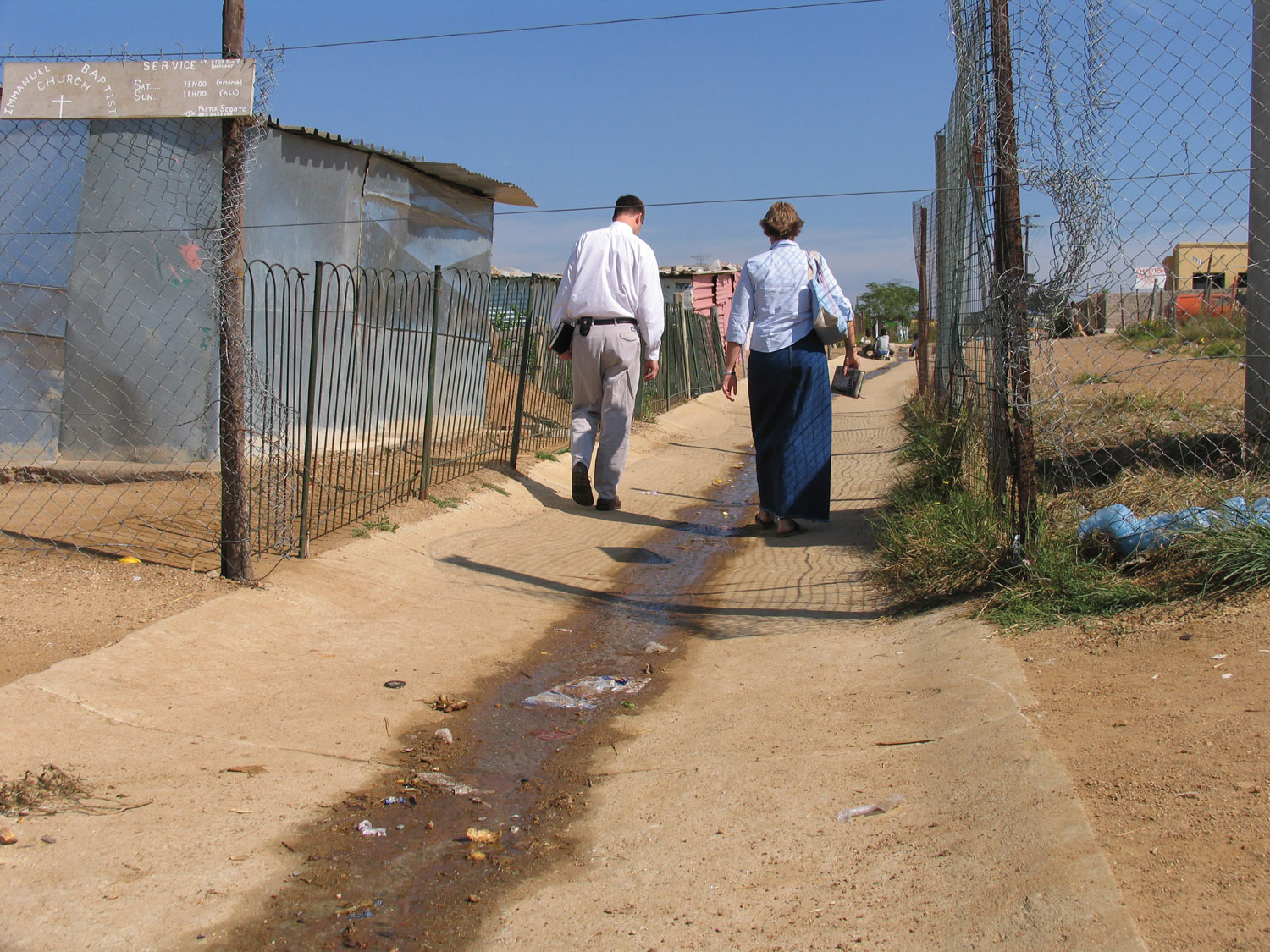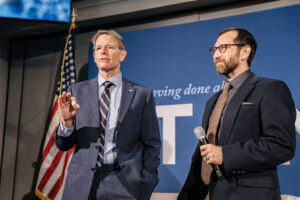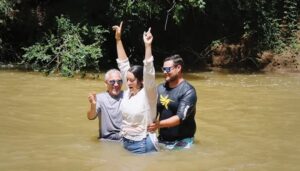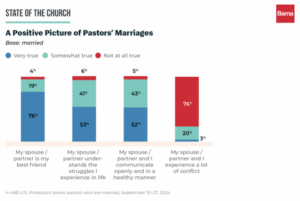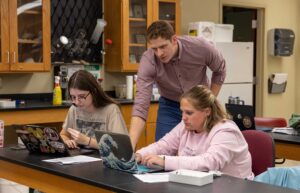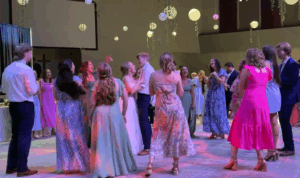
JOHANNESBURG, South Africa (BP)–The African sun glints brilliantly off the little one-room tin shanty. The roof glows like a beacon among the dirt paths and ramshackle huts crowded on the South African hills. Inside the shanty it is peaceful and cool. A handmade sign hanging from the fence announces that this blue-trimmed tin shanty is the meeting place of Emmanuel Baptist Church.
This is Diepsloot, South Africa, an informal settlement situated just north of Johannesburg in South Africa’s Gauteng (pronounced “How-tang”) province. Diepsloot sprang up 10 years ago when “squatters” from all over southern Africa came to Johannesburg seeking jobs. They built shacks on unoccupied land using what materials they could scrounge up: corrugated tin, clumps of clay, a few bricks and scraps of wood.
Today, the government is slowly replacing the shacks with modest two- and three-room tin-roofed cottages serviced with electricity. Water is drawn from common spigots. Still, unemployment exceeds 50 percent.
Emmanuel Baptist Church was planted by International Mission Board missionary Kurt Holiday. The little congregation grew out of a Bible study conducted under an old tarp strung between poles outside the home of Dokotela Mdimiso, an elderly local resident.
Dokotela owns a plot of land in Diepsloot. On this plot is the one-room tin shack he calls home. Surrounding a narrow common area are four other tin shacks which he rents out for a pittance. A few months ago he made a place for the blue-trimmed tin Baptist church building.
Inside the church there is just enough room for 20 men, women and children to gather each Sunday for praise and worship. The room is smaller than a typical American living room. A fiery young preacher named Thobabasiu Segoto leads the congregation.
“We need to preach and preach, and evangelize and evangelize,” Pastor Segoto says as he stands outside the church building and passionately looks out over the hills of Diepsloot. Segoto lives more than 30 miles away. He does not have a car, so he has to take a series of mini-bus taxis to get to the church. It typically takes him an hour and a half one way.
“We do not know whom God will save. We want a stand [a plot of land] for all the people of Diepsloot,” Segoto explains before the service. “Hopefully, we can buy a stand and plant a larger church there where everyone can see it and reach Diepsloot for Christ.”
The worshipers begin to filter in. They are excited to see that IMB missionary Charlie Lechner and IMB journeyman Melissa Hall have come to visit. There are hugs and warm greetings as men, women and children assemble inside.
Scraps of carpet partially cover the gravel floor. Twenty folding chairs are arranged in three rows. The front row sweeps around the side of a folding table covered with a white cotton tablecloth. The table serves as the pulpit.
Pastor Segoto’s native language is Sotho. His congregation’s native tongue is Zulu. So, Pastor Segoto speaks and preaches in English, and one of the church leaders, Innocent Ncube, translates into Zulu.
Soon the bright sounds of Sotho and Zulu Christians worshiping soars from the tin church.
“Hosanna, Hallelujah, Hosanna, Hallelujah.”
There are no musical instruments. No one can afford them, but there really isn’t room for them. Bibles are used to beat in rhythm and keep time to the songs as bodies sway and hands clap.
“Amen,” Segoto calls out.
“Amen,” the congregation responds.
Segoto announces a song. A tall, elegant young woman in the back row leads out the singing.
“Glories to God,” she sings.
To the American ear, “glories” should be “glory.” Upon reflection, perhaps the African plural is more accurate.
The worshippers respond:
“Glory Hallelujah,
“We are here because of love
“Our Lord is forever.”
With voices strong and clear, Bibles beating time and high shrill falsetto notes urging the worshipers on, the little congregation sings high praises in their cathedral of wood and tin. Their worship illuminates the still mid-day air and carries up and down the concrete drainage ditch running down the middle of the dirt side street next to the church.
THE WORK
Church plants like Emmanuel Baptist Church is just one part of the church planting and church development work of Charlie and Angie Lechner and Kurt and Janna Kay Holiday in the western Gauteng province of South Africa. They call themselves the Western Gauteng Evangelism Team (WGET).
Another part of their ministry is training pastors and church leaders who in turn will lead churches throughout the Gauteng province.
Each Monday night, Charlie Lechner drives about 30 miles to the town of Ennerdale. There in the worship hall of the Ennerdale Outreach Ministries complex, he meets with five pastors from the surrounding areas. They are there for Theological Education by Extension (TEE) to earn their Christian Worker’s Certificates through the distance learning program of the Cape Town (South Africa) Baptist Seminary.
Using curriculum developed by the seminary, tonight Charlie will give an exam on their New Testament studies class. First there is a devotional led by one of the students, Pastor Anthony. Then they pray.
Charlie hands out the exam and his students hunker down. Hands run nervously through hair. Grimaces flicker across faces. One of the students, Pastor Freddy, looks up at the ceiling as if searching for answers in the heavens. Pencils etch out answers. After about 45 minutes, everyone has finished.
There will be no lecture on exam nights. Instead Charlie invites any questions these pastors may have about the material or about ministry challenges they may be facing.
Pastor Robert raises his hand.
“Pastor Charlie,” he asks, “how do we keep people in our churches? What are some things we can do to keep people who come in the front door from going out the back door?”
It’s a question pastors all over the world struggle with. Instead of presuming to have all the answers, Charlie opens the question up to the other pastors in the class.
Pastor Robert’s classmates begin responding with ideas and approaches that have worked and some that haven’t.
The students debate discipleship and ministry theories. They spend the next two hours discussing the challenges of ministering to their communities.
Charlie leads the discussion gently; he wants them to turn to Scripture, the Lord and to each other for answers.
Pastor Andres laments the effect “Christian” funerals are having on evangelism.
“What do you mean?” Charlie inquires.
Andres explains that when someone in his community dies, there are elaborate and expensive preparations made for the funeral. Friends and relatives come from far away. They need a place to stay. On the days leading up to the funeral, meals are prepared for the ever-growing number of visitors. On the day of the funeral, a beautiful casket is prepared, a funeral home is rented, suits and new dresses are purchased, and huge feasts are set forth in memory of the dead loved one. All these expenses are on top of the storage fee for the body, the cost of the funeral plot and countless other incidentals.
With the highest AIDS rate of any industrial country in the world, the effects of poverty and high instances of industrial accidents, death in these South African communities is common. Andres shakes his head at the oppressive cost of these “Christian” funerals.
Pastor Freddy adds that a cheap “Christian” funeral costs 10,000 Rand (the equivalent of $1,500). “These people only earn about 30,000 Rand per year, though,” he says.
“Why are these called ‘Christian’ funerals?” Charlie asks. “Funerals like that aren’t anywhere in the Bible.
Charlie takes the opportunity to suggest that these pastors could lift a heavy burden of tradition from the backs of their flock by applying biblical teaching to burying their dead. He encouraged them to stand firm in their teaching because there will be opposition anytime long-cherished traditions are challenged, regardless of how damaging those traditions may be.
Later, Charlie explains that these pastors-in-training have to learn how to do ministry on their own without relying on outside “experts.”
THE WORKERS
Charlie and Angie Lechner met during their undergraduate years at Ouachita Baptist University in Arkadelphia, Ark. Charlie was raised as a nominal Roman Catholic by a single mother and moved around quite a bit as a child. He was led to a saving knowledge of Jesus Christ through a Southern Baptist youth group in Granbury, Texas.
“I knew I was going to be a minister almost from the moment I got saved,” Charlie said. However, God shaped his vision of ministry through those youth group activities, then through people he met and professors he studied under at Ouachita.
Angie was a Southern Baptist missionary’s kid who lived most of her life on the mission field in the Caribbean. At Ouachita, she was away from home for the first time. She felt the twinge of displacement that is common for many MKs whose parents are American but who have never lived in America for any length of time. She made friends quickly, and Charlie was part of a larger circle of friends.
“As a missionary’s kid, I knew missions,” Angie said. She was open to being a missionary and committed her life to Christian service at an early age.
God brought this young minister-in-training and MK together during their sophomore year. Their passion for missions was fanned into flame during student mission trips to Zimbabwe and Ecuador.
After graduating with a bachelor’s in biblical studies with languages in 1989, Charlie and Angie got married and moved to Fort Worth, Texas, so Charlie could enroll at Southwestern Baptist Theological Seminary. God continued to shape their vision for ministry.
“I felt a call to pastor a church while at Southwestern,” Charlie said. “That confused me because I thought I was headed to be a missionary, and because I had no experience preaching or being a pastor.”
He shared his concerns with one of his seminary professors.
“He explained that if God was calling me to pastor a church, then God would provide me with whatever I needed to do the job,” Charlie recalled.
Although the Lechners had begun the process with the IMB to become missionaries, Charlie accepted a call to be the bivocational pastor of Midway Baptist Church in Sarepta, La., upon graduation from Southwestern in 1994.
Charlie and Angie moved to Sarepta and both got jobs teaching school. They threw themselves into ministry at Midway Baptist Church, but God kept their hearts tuned to missions even while He blessed their pastoral ministry.
“Sarepta was God’s way of maturing us as a couple and developing Charlie’s heart for people,” Angie said. “Also, our time there built up our confidence in God’s ability to provide for our every need and helped us deepen our commitment to missions. We loved our time when Charlie was pastoring Midway.”
By this time, Coleson and William had been born into the Lechner household. God made ways for the Lechners to keep in connection with IMB missionaries and personnel, and in 1997 the IMB appointed them to work in Madagascar.
In 1999, they were assigned to work in church planting and church development in the Gauteng province of South Africa. The Lechner family continued to grow when Luke and later, Abigail, were born.
THE WORRY
South Africa was once a pariah of the western world because of its codified system of racial separation and segregation called apartheid in effect during the last half of the 20th century.
Now, 10 years after apartheid laws were struck down in votes cast by all races in the country, South Africa is trying to rebuild itself as a place where people can live and work together regardless of racial distinctions. Poverty, AIDS and racial tensions continue to make things difficult.
Islam is a growing influence among many cultural groups in South Africa. Baptist pastors also feel the heat from Hindu encroachments on a daily basis. One local Baptist pastor who feels the heat of Hinduism and Islam keenly, and with whom Charlie Lechner works and supports, is Charlie Chinnasany.
“Sometimes it feels like solid doctrine and our Baptist evangelistic heritage is slipping away as more and more Christians here want to go where they get their ears tickled,” Chinnasany observes.
Pastor Chinnasany is a fourth-generation South African of eastern Indian descent. His great-grandparents emigrated from India to work in the sugar fields of southeastern South Africa in the KwaZulu-Natal province. Pastor Chinnasany leads Maranatha Baptist Church, a small congregation of mostly people of Indian descent. He was a graduate of the Baptist Theological College in the Johannesburg suburb of Randburg.
The church he has pastored for 10 years is outside Johannesburg in Lenasia. He estimates that more than 100,000 Indians live in Lenasia. Numerous mosques in the area lend credence to his estimates.
Maranatha is the only Baptist church in Lenasia. It has about 40 members, when he includes children in the count.
“We are a healthy church now, emotionally, spiritually, and financially,” Chinnasay says. “We want to see numerical growth and are willing to do what it takes to see it. But we need help. We are praying for the help we need.”
He gets discouraged sometimes, he says, because too many Baptists in South Africa get caught up in “mushroom churches” that pop up almost overnight and attract big audiences who are looking for something new and exciting.
“Churches with no heritage, no confession, no history of defending the faith in the face of adversity and persecution — these churches are not acceptable,” Chinnasay says. “The fields are ripe unto harvest among Indian South Africans. But we must preach the Word so as to lead to application, holiness and growth.”
Lechner and Holiday and the WGET have come alongside Chinnasay. They pray with him, counsel with him on strategies and approaches, and do all they can to undergird his ministry.
THE WONDER
Despite the apparent challenges they face, the Lechners are excited about the light God is shining into South Africa.
“We are making an impact for God here,” Lechner says.
“Success is being faithful to God. When I go to bed at night, I can say, ‘Well, Lord, I have done everything I can do today for you.’ That is how I measure success,” he says.
Back in the blue-trimmed tin shanty, two young women come forward and stand next to the makeshift pulpit. They both carry small babies on their backs in the manner typical of African mothers. They sing a hymn in two-part harmony. The words are in Zulu, but the tune is unmistakable. In these simple words sung with beautiful voices is the wonderful hope of Baptist brothers and sisters in South Africa.
“There’s a land that is fairer than day,
“And by faith we can see it afar.
“For the Father waits over the way
“To prepare us a dwelling place there.
“In the sweet bye and bye,
“We shall meet on that beautiful shore.
“In the sweet bye and bye,
“We shall meet on that beautiful shore.”
–30–
